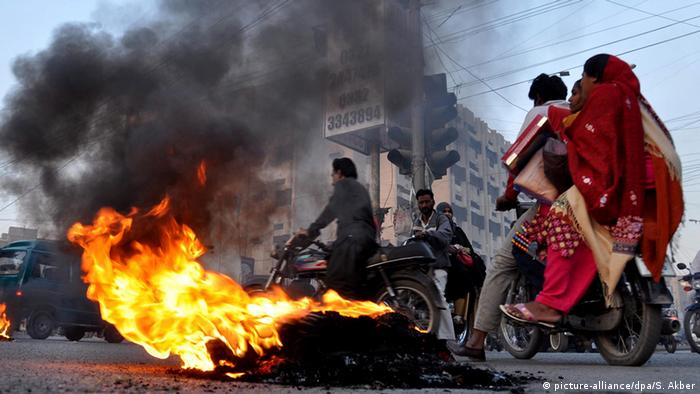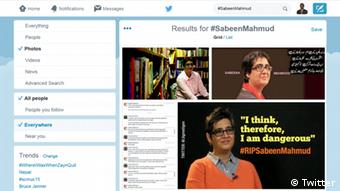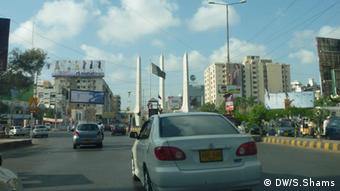Several people have been arrested in connection with Pakistan's Shiite killings and the murder of activist, Mahmud. These suspects are well-educated, urban youth. DW analyzes the "modern jihadist" phenomenon in Pakistan.
The militants involved in killing some 50 Ismaili Shiites and murdering human rights campaigner Sabeen Mahmud in April have been arrested and are now in custody, Interior Minister Nisar Ali Khan told reporters on Wednesday, May 21.
Around 50 people were killed and more than a dozen others injured on May 13 when armed men fired at a bus carrying members of the Ismaili community - a minority Shiite Muslim sub-sect - near Safoora Chowk in the southern Pakistani city of Karachi. It was the worst anti-Shiite assault in Pakistan since January 30, when a suicide attack in a mosque in the southern Shikarpur district claimed 61 lives.
A month earlier, rights activist Sabeen Mahmud was also killed in Karachi by unidentified gunmen. She was on her way home in her car after organizing a seminar on the Balochistan conflict and thePakistani military's alleged atrocities in the restive province.
Pakistani authorities said that the arrested suspects confessed to various other crimes, including grenade attacks on schools and security forces and an assault on an American educator.
It is not clear whether these men belonged to a known Islamist group, but the security officials claim at least one of them was in contact with al Qaeda's chief, Ayman al Zawahiri.
But what is more concerning is that many of these suspects are university graduates, having studied disciplines as diverse as engineering, business and Islamic studies.
Suspects' profiles
On May 21, Qaim Ali Shah, the chief minister of the southern Sindh province, shared the suspects' details with reporters at a press conference in Karachi.
According to Shah, Tahir Hussain Minhas, who masterminded the Ismaili killings, was a trained terrorist with an expertise in bomb-making. Minhas had personally met al Qaeda's slain leader Osama bin Laden and the current chief Zawahiri on number of occasions, he said.
Saad Aziz, who confessed to murdering Mahmud, had a degree in business administration from one of Pakistan's most prestigious business schools, the Institute of Business Administration (IBA). He has been involved in terrorist activities since 2009, the chief minister said.
Another captured suspect, Mohammad Azfar Ishrat, is an engineer by profession, whereas Haafiz Nasir received a Masters degree in Islamic Studies from Karachi University. Nasir was particularly involved in motivating people for "jihad."
Urban jihadism
The jihadist activities in Pakistan are usually associated with organizations like the Tehreek-i-Taliban Pakistan (TTP). Most people in the West tend to believe that poor madrassah students in parts of Pakistan, particularly in the semi-governed northern tribal region near Afghanistan, are behind the ongoing militancy in the Islamic country. It is true that the Taliban and other Islamist groups with roots in the restive tribal areas do carry out violent attacks in Pakistan (the assault on Malala Yusufzai and the December 16 carnage in a Peshawar school are examples), however, the phenomenon of urban jihadism is not new in Pakistan, and is largely overlooked.
"Political Islam is very much an urban phenomenon and we can't ignore this aspect, while analyzing the growth of extremism in Pakistan," Asad Butt, a Vice Chairman of the Human Rights Commission of Pakistan (HRCP), an independent rights group, told DW.
"The West only focuses on the madrassah education, but what is equally important to look at is the curriculum taught in Pakistan's mainstream educational institutions, which nurtures a jihadist mindset and preaches violence," Butt added. "The growth of extremism and intolerance is not only related to poverty, otherwise we wouldn't have seen the urban-based affluent people resorting to hard-line Islamist ideologies and pan-Islamism, which talk about global jihad."
Tanveer Ahmed, a student at Karachi University, agrees with Butt's analysis: "There is no room for liberal voices at our university. The authorities don't allow dissent. A clear example of this is that a secular forum of teachers and students wanted to hold a seminar on Balochistan and Mahmud's murder at the campus earlier this month, but the authorities didn't allow it." Ahmed said the seminar organizers had to hold the talk outside the university auditorium in open air.
Identity crisis, Islam, and political Islam
Butt believes that youngsters, like Saad Aziz, suffer from an identity void which they try to fill in with an Islamist ideology.
"They look at the Middle East. They talk about the US policies in the world, the wars in the Muslim countries. They are actually searching for an identity," he said, adding that the Pakistani state had deliberately tried to build an "Arabic identity" for its citizens, linking their history to the Arab states and detaching them from their Indian roots to cement their regional strategic interests.
"I don't know what is taught at madrassahs, I can tell you with authority that what they teach at universities can force anyone to become a militant," Ahmed emphasized.
But there are people in Pakistan who argue that political Islam is a global phenomenon but those who are becoming radicalized in the country also get impetus from their own ruling elite's corruption and governance failures. They say that Pakistani Muslims, particularly the youth, are "overly sensitive" not only about the vulnerability of Islam globally but also about a lack of direction domestically.
"Islam is in a particularly vulnerable point of the arc in present times. Pakistani Islam experiences more elaborate anxieties, and therefore acts out more, compared to other Islams because of our national anxieties," Ali Hassan, a Pakistani writer in Karachi, told DW.
Experts say that if these "anxieties" - no sense of direction, unemployment, rampant corruption, the failing economy - are not addressed by the government, the country's youth will continue to seek answers in extremist doctrines. The state cannot defeat terrorism by force - secular education and a change of course vis-à-vis Pakistan's Islamic ideology could play a big role in reversing the tide.




No comments:
Post a Comment